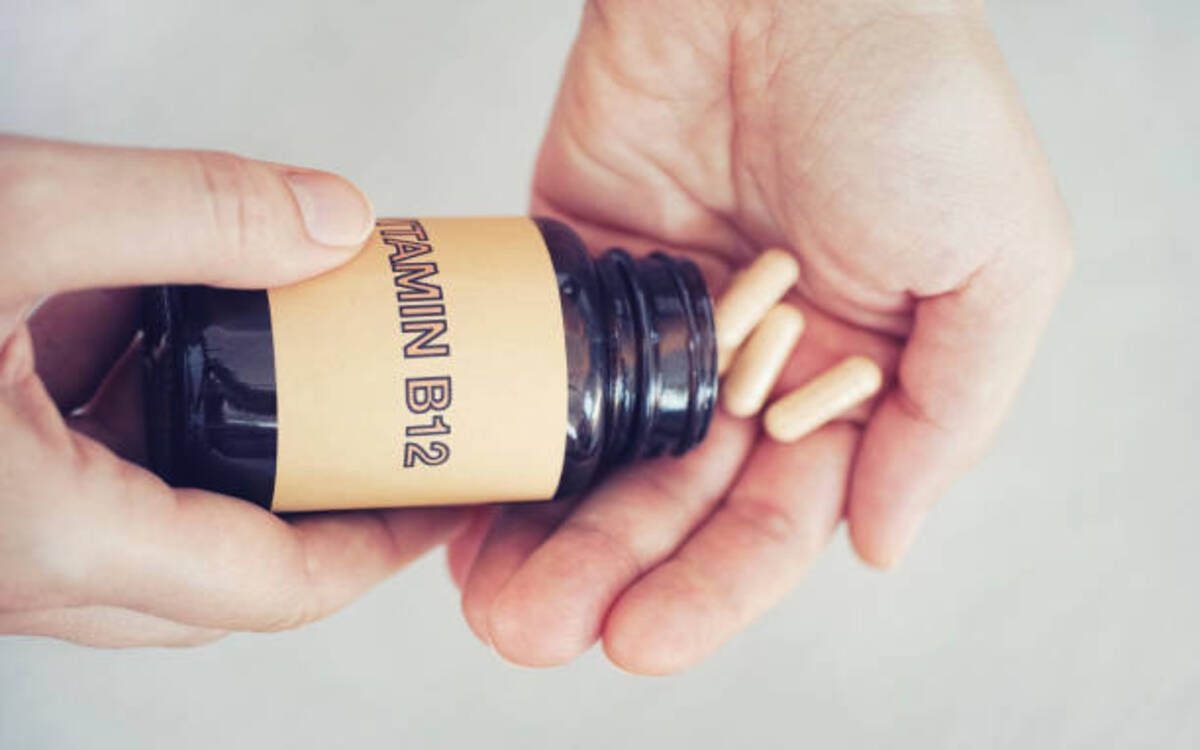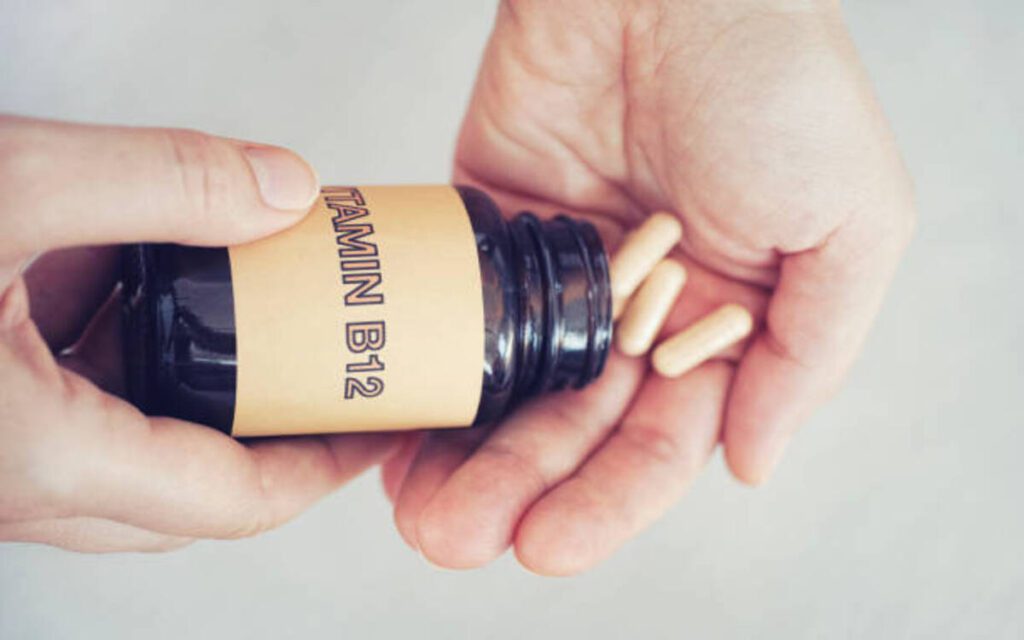The Best Fluffy Pancakes recipe you will fall in love with. Full of tips and tricks to help you make the best pancakes.

Vitamin B12 is an essential nutrient that plays many crucial roles in the body. It helps make DNA and red blood cells, keeps the nervous system functioning properly, and more.

While B12 is found naturally in foods like meat, eggs, and dairy, some people may need supplements to get enough of this important vitamin. Those at risk of B12 deficiency include vegetarians, vegans, the elderly, and those with conditions affecting B12 absorption.
This comprehensive guide on vitamin b12 supplements dosage for different age groups will cover everything you need to know about the recommended dosage for vitamin B12 supplements. You’ll learn about:
- The importance of vitamin B12 and who may need supplements
- Recommended daily intakes for different ages and populations
- The benefits of adequate B12 levels and risks of deficiency
- Possible side effects and safety considerations with high doses
- How to choose the right type of B12 supplement
Let’s start with an overview of this essential nutrient and why B12 supplementation is often necessary.
Understanding Vitamin B12 Supplements Dosage
Vitamin B12, also known as cobalamin, is a water-soluble nutrient that is essential for good health. It helps:
- Form red blood cells
- Maintain healthy nerve cells and neurological function
- Synthesize DNA
- Convert food into energy
B12 cannot be produced by the body, so it must be obtained from food or supplements. Animal foods are the primary natural source of vitamin B12. This includes meat, poultry, fish, eggs, and dairy products.
Plant foods do not contain B12 unless fortified. So those following vegan or vegetarian diets require B12 supplementation or fortified foods.
B12 is absorbed in the stomach and small intestine. It requires stomach acid and a protein made by the stomach called intrinsic factor to be absorbed properly.
Certain conditions like pernicious anemia, celiac disease, Crohn’s disease, ulcerative colitis, and gastrointestinal surgeries can affect B12 absorption and increase the risk of deficiency.
The elderly are also more prone to B12 deficiency because they produce less stomach acid required for B12 absorption from foods.

Importance of Vitamin B12 Supplements
Vitamin B12 supplements help prevent and treat deficiency in those who may not get enough from their diets or have issues with absorbing B12 properly.
B12 deficiency can lead to serious health consequences like:
- Megaloblastic anemia – low red blood cell count
- Neurologic issues – numbness, trouble walking, memory loss, depression
- Fatigue and weakness
- Loss of appetite
- Shortness of breath
- Gastrointestinal problems
Supplements are crucial for vegetarians/vegans to prevent deficiency. The Institute of Medicine recommends anyone over 50 take B12 supplements or fortified foods because deficiency is so common in older adults.
Those with digestive conditions that affect absorption like celiac disease and Crohn’s disease may also require supplements under medical supervision.
Let’s now look at determining the ideal dosage for your needs.
Also Read: How To Heal Bone-on-Bone Joint Pain Permanently
Determining the Right Dosage
The dosage for vitamin B12 supplements can vary based on factors like your age, health status, and reason for taking it. Here’s an overview of how daily needs differ:
Recommended Dietary Allowance
The Recommended Dietary Allowance (RDA) is the average amount needed daily to meet B12 needs for 97-98% of healthy individuals. It’s used to determine the Daily Value (DV) listed on supplement labels.
Here is the RDA for vitamin B12:
- 0-6 months: 0.4 mcg
- 7-12 months: 0.5 mcg
- 1-3 years: 0.9 mcg
- 4-8 years: 1.2 mcg
- 9-13 years: 1.8 mcg
- 14+ years: 2.4 mcg
- Pregnant women: 2.6 mcg
- Lactating women: 2.8 mcg
So most supplements will list the %DV based on 2.4 mcg. A supplement with 100% DV provides 2.4 mcg.
Factors Affecting Dosage
Consider the following factors when determining your ideal vitamin B12 dosage:
- Age – Older adults may benefit from higher doses like 100-400mcg per day.
- Diet – Vegans/vegetarians need 2-3x higher intake from fortified foods or supplements.
- Digestive conditions – Those with absorption issues often require high doses or Vitamin B12 injections.
- Medications – Drugs like metformin and PPIs can affect B12 absorption.
- Reason for supplementation – Treating deficiency requires higher doses than for maintenance.
- Medical conditions – Diseases like diabetes, anemia, and thyroid disorders increase B12 needs.
With your doctor’s guidance, testing B12 blood levels can help determine the dosage you need. Let’s look at specific recommendations for different groups.
Recommended Dosage for Age Groups
The ideal vitamin B12 dosage can vary based on your age and health status:
Infants & Children
- 0-6 months: 0.4 mcg
- 7-12 months: 0.5 mcg
- 1-3 years: 0.9 mcg
- 4-8 years: 1.2 mcg
- 9-13 years: 1.8 mcg
Unless advised by their doctor, healthy children do not need supplemental B12 since they get enough from breast milk, formula, or food.
Adolescents & Adults
- 14+ years: 2.4 mcg
- Pregnant women: 2.6 mcg
- Breastfeeding women: 2.8 mcg
Most healthy adults meet their needs through diet alone. Those with digestive disorders, on certain drugs, or following plant-based diets may require a supplement.
Older Adults
As you get older, stomach acid production decreases, lowering the absorption of B12 from foods. For those over 50, the Institute of Medicine advises getting extra B12 from supplements or fortified foods.
- 50+ years: Most benefit from 25-100 mcg supplement
- Treating vitamin b12 deficiency: Typically 1,000-2,000 mcg per day
Let’s take a look at the many benefits you can expect when getting enough of this nutrient either through diet alone or supplements when needed.
Also Read: Secret To Keep Your Blood Below 100 mg/dl At All Time
Health Benefits of Vitamin B12
Consuming adequate vitamin B, whether from food sources or supplements, offers many benefits:
Energy Production
Vitamin B12 plays an essential role in energy metabolism in the cells. It helps convert carbohydrates into glucose, acting as a cofactor for enzymes involved in energy production from the food we eat.
B12 deficiency can lead to decreased energy and fatigue. Supplementing helps restore healthy energy levels when lacking in the diet.
Red Blood Cell Formation
B12 is necessary for red blood cells to divide and replicate properly. It’s needed to synthesize DNA during red blood cell production.
When deficient, red blood cells become enlarged, reducing oxygen delivery throughout the body. Supplementing corrects anemia caused by B12 deficiency.
Neurological Health
Vitamin B12 also maintains the nervous system by forming the protective myelin sheath around nerve cells. It also helps produce neurotransmitters responsible for cellular communication.
Without enough B12, neurological symptoms can occur including numbness, walking difficulties, depression, and cognitive decline. Getting adequate B12 can improve these neurological symptoms of vitamin b12 deficiency.
As you can see, vitamin B12 is vital for energy, mood, brain health, and preventing anemia. Next, let’s discuss important safety considerations when supplementing.
Risks and Potential Side Effects
While vitamin B12 is water soluble and any excess is generally excreted in urine, there are some potential side effects to be aware of – especially at high doses.
Possible Risks of High Doses
Consuming more than the recommended amount of B12 for extended periods through supplements does not provide any benefit and may potentially cause adverse reactions in some people.
According to the Institute of Medicine, the upper intake level for adults is 2,000 mcg per day. Higher doses could potentially lead to:
- Acne breakouts
- Mood changes like anxiety, irritability or anger
- Increased risk of cardiovascular events, especially in diabetics
- Elevated blood pressure
- Diarrhea or cramping
- Headaches
- Nausea
- Itching or flushing
High doses may also affect kidney function in those predisposed to kidney disorders.
To be safe, stick to the standard dosage recommendations unless prescribed higher amounts by your healthcare provider.
Potential Side Effects
When taken in recommended amounts, vitamin B12 supplementation is generally considered safe. However, some users report side effects such as:
- Mild nausea, vomiting, diarrhea
- Dark stools
- Constipation
- Allergic reactions like itching, swelling, rash (rare)
- Headaches or dizziness
These side effects are usually mild and subside quickly. If any symptoms of vitamin b12 deficiency persist or worsen, discontinue use.
Those with the genetic disorder Leber’s disease are at risk for worsening vision when taking high doses of B12.
Interactions with Medications
B12 supplements can potentially interact with the following medications:
- Chloramphenicol – Antibiotic that may reduce B12 absorption
- Proton pump inhibitors – Stomach acid reducers like omeprazole that can decrease absorption of oral B12 supplements
- Histamine H2 blockers – Pepcid, Tagamet, and other antacids that may impair absorption
- Metformin – Diabetes medication shown to lower B12 levels over time
If taking these drugs long-term, talk to your doctor about monitoring B12 status or adjusting supplement dosage.
Now that you know about supplementing safely, let’s look at the dosage recommendations for different age groups.

Vitamin B12 Supplements for Age Groups
The recommended dosage can vary based on your age and health status:
Infants & Children
Infants and children typically get sufficient B12 from breastmilk or fortified foods. Supplements are only recommended if advised by a pediatrician for a diagnosed vitamin b12 deficiency.
Newborns and infants 0-12 months
- 0 – 6 months: 0.4 mcg
- 7 – 12 months: 0.5 mcg
Can be given as an oral supplement or injection if deficient.
Children 1-3 years
- 1-3 years: 0.9 mcg daily
Children 4-8 years
- 4-8 years: 1.2 mcg daily
Children 9-13 years
- 9-13 years: 1.8 mcg daily
Oral tablets or gummies are appropriate for older children who can safely swallow them.
Adolescents & Adults
Most healthy adolescents and adults get sufficient B12 from food sources. Those with increased needs or inadequate diets can take supplements.
Adolescents 14-18 years
- 2.4 mcg per day
Adults
- 2.4 mcg per day
- Pregnant women – 2.6 mcg
- Breastfeeding women – 2.8 mcg
Adults with digestion issues or following strict vegetarian or vegan diets should take supplements or consume adequate fortified foods.
Older Adults
Up to 30% of people over 50 are deficient in B12. Older adults should meet the following recommended intakes:
Over 50 years
- 2.4-100 mcg per day through diet and supplements
Treating vitamin b12 deficiency
- 1,000 – 2,000 mcg per day under medical supervision
High doses may be required for those with pernicious anemia or absorption disorders. Consult your doctor and get your B12 status assessed when supplementing.
Also Read: #1 Treatment For Erectile Dysfunction That Fix Erection Problems and Delivered Real Result
Choosing the Right Vitamin B12 Supplement
There are many vitamin B12 supplements available in various forms. Here are some tips for selecting one that meets your needs:
Forms of Vitamin B12
- Cyanocobalamin – Most commonly available and easily converted into active B12 forms the body can use. Considered very bioavailable.
- Methylcobalamin – “Active” form of B12 used directly in metabolic processes. May be preferable for those with absorption issues.
- Hydroxocobalamin – Typically used for B12 deficiency injections but also available in oral forms. May improve retention.
- Adenosylcobalamin – Active form involved in energy metabolism. Less commonly available than other forms.
All forms are effective, but cyanocobalamin is typically the most economical and commonly available. Check the %DV rather than the specific dosage amount when comparing products.
Choosing a Quality Supplement
When selecting a vitamin B12 supplement, consider the following:
- Amount per serving – Aim for 100% DV (2.4mcg) or slightly higher for convenience/value
- Form – Cyanocobalamin, methylcobalamin, hydroxocobalamin, adenosylcobalamin
- Third-party testing – Look for GMP certification, NSF certification, ConsumerLab approval, USP verification of quality.
- Easy absorption – Sublingual tablets, gummies, or liquids may be preferable over capsules for those with absorption issues.
- Allergies – If allergic to cobalamin or any ingredients like soy/gluten, check labels carefully.
Speak with a Healthcare Provider
Those diagnosed with a deficiency or with medical conditions affecting absorption may require high, therapeutic doses in the 1,000-2,000 mcg range.
It’s important to work with a doctor to determine your needs through lab testing. Self-supplementing with high amounts without medical guidance can be risky.
For routine maintenance and meeting general daily needs, standard OTC supplements at 100-500 mcg are typically sufficient and safe.
Vitamin B12 Deficiency
Vitamin B12 deficiency can lead to anemia, fatigue, neurological problems, and other health issues. Groups at risk include vegans, vegetarians, the elderly, and those with conditions affecting absorption of vitamin b12. Testing levels and supplementing when low vitamin b12 levels can prevent deficiency.
mcg
Mcg (micrograms) is the standard unit used to measure vitamin B12 amounts in supplements and food sources. The daily recommended intake for B12 is 2.4 mcg for adults, with slightly higher amounts needed for pregnant and breastfeeding women.
Source of Vitamin B12
The main food sources of vitamin B12 are animal-based including meat, poultry, fish, eggs, and dairy products. Fortified foods like cereals, nut milks, and nutritional yeast can also provide B12 for vegetarians and vegans.
Vitamin B12 Intake
The recommended daily vitamin B12 intake is 2.4 mcg for adults, increasing to 2.6-2.8 mcg for pregnant and lactating women. Older adults are advised to get extra B12 from supplements or fortified foods due to reduced absorption capabilities.
Enough Vitamin B12
Consuming adequate B12 prevents deficiency and its effects on energy, mood, blood cells, and brain health. Most people meet needs through diet, but supplements may be required for those at risk of low levels like vegans and the elderly.
Vitamin B12 Dosage
The standard supplemental dosage for vitamin B12 ranges from 25-100 mcg per day for adults over 50, while therapeutic doses to treat deficiency are much higher at 1,000-2,000 mcg and should be medically supervised.
Dose of Vitamin B12
The recommended daily dose of B12 is 2.4 mcg for adults, 2.6 mcg for pregnant women and 2.8 mcg for those breastfeeding. Older adults are advised to supplement with 25-100 mcg per day for healthy B12 levels.
Get Enough Vitamin B12
Getting enough vitamin B12 maintains energy levels, mood, memory, and red blood cell health. Those at risk of deficiency should have levels tested and supplement if low, under a doctor’s care for proper dosing.
mcg of Vitamin B12
The standard dosage unit for vitamin B12 is the microgram (mcg). Recommended intakes range from 0.4 mcg for infants to 2.4-2.8 mcg for adults, with increased supplementation of 25-100 mcg advised for those over 50.
Conclusion On Vitamin B12 Supplements Dosage
Vitamin B12 is an essential nutrient that plays a vital role in red blood cell formation, neurological function, DNA synthesis, energy metabolism, and more.
While most people can meet their needs through diet, those at risk of vitamin b12 deficiency like vegans, older adults, or people with absorption of vitamin b12 issues may benefit from supplementation.
Here is a summary of the recommended dosages of vitamin B12 supplements for different age groups:
Infants & Children
- 0-6 months: 0.4 mcg
- 7-12 months: 0.5 mcg
- 1-3 years: 0.9 mcg
- 4-8 years: 1.2 mcg
- 9-13 years: 1.8 mcg
Healthy children typically get a sufficient amount of vitamin b12 from food and breast milk. Supplements are only needed if b12 for vitamin b12 deficiency is diagnosed by a doctor.
Adolescents & Adults
- 14+ years: 2.4 mcg
- Pregnant women: 2.6 mcg
- Breastfeeding women: 2.8 mcg
Most healthy teens and adults meet their needs through diet. Those following plant-based diets or with absorption issues may require supplements.
Older Adults
- Over 50 years: 25-100 mcg
- Treating deficiency: 1,000-2,000 mcg under medical supervision
Older adults over 50 are advised to supplement due to reduced absorption. Higher therapeutic doses may be needed to resolve the deficiency.
In summary, infants and children rarely need supplements if eating a balanced diet. Teens and younger adults can typically get sufficient B12 from food alone. Older adults are encouraged to supplement daily with 25-100 mcg. Those with deficiencies or absorption disorders may need higher doses prescribed by their doctor.
The recommended daily allowance is 2.4 mcg for adults, rising to 2.6-2.8 mcg for pregnant and breastfeeding women respectively. Older adults over 50 and those treating deficiencies are advised to supplement with 25-100 mcg per day or 1,000-2,000 mcg if deficient.
Supplementing with vitamin B12 has many benefits including improved energy, healthier blood cells, enhanced brain function, and protection from anemia. When taken correctly, it is very safe with few side effects.
Choosing a quality B12 supplement providing at least 100% DV in a form like cyanocobalamin will meet most needs of the average healthy adult vitamin b12 supplementation on cognitive.
Those with medical conditions should have their status monitored and work with a doctor to determine the ideal supplementation dosage and method.
While vitamin B12 supplementation is important for those at risk of deficiency, a balanced, nutritious diet should always come first when trying to meet your daily intake of essential vitamins and minerals.
Frequently Asked Questions
What is the recommended daily dosage for vitamin B12 supplements?
The recommended daily allowance (RDA) for vitamin B12 is 2.4 mcg for adults. Most supplements provide 100-500% DV, which equates to 24-120 mcg. Those over 50 are advised to supplement with 25-100 mcg per day.
Are there any side effects associated with taking vitamin B12 supplements?
Vitamin B12 is considered very safe, even at high doses. Some mild side effects can include nausea, diarrhea, headaches, itching or flushing. Acne and mood changes may occur with extremely high megadoses.
What are the benefits of taking vitamin B12 supplements?
Vitamin B12 supplements can help improve energy, boost mood, support neurological health, prevent anemia and fatigue, and maintain healthy cells and DNA synthesis.
What are some common brands of vitamin B12 tablets?
Some top-rated brands of B12 supplements include Nature Made, Nature’s Bounty, NOW Foods, Garden of Life, Solgar, and Pure Encapsulations.
How much vitamin B12 is found in common foods?
Beef liver – 122 mcg per 100g Clams – 98.9 mcg per 100g Sockeye salmon – 4.9 mcg per 100g Tuna fish – 2.5 mcg per 100g Nutritional yeast – 1-9 mcg per tablespoon Eggs – 0.6 mcg per large egg Dairy milk – 0.9 mcg per cup
What is the treatment for high levels of vitamin B12 in the body?
Elevated B12 levels are rare and not a cause for concern in most cases. Reducing supplementation dosage or discontinuing supplements should lower blood levels. Very high levels may require stopping injections or medical treatment to lower absorption.
References
- Office of Dietary Supplements – Vitamin B12 Fact Sheet
- NIH – Vitamin B12 Dietary Supplement Fact Sheet
- British Dietetic Association – Vitamin B12 Food Fact Sheet
- Harvard Health – Should I take vitamin B12?
- Cleveland Clinic – Vitamin B12 Deficiency
- MedlinePlus – Vitamin B12
- University of Rochester Medical Center – Vitamin B12






